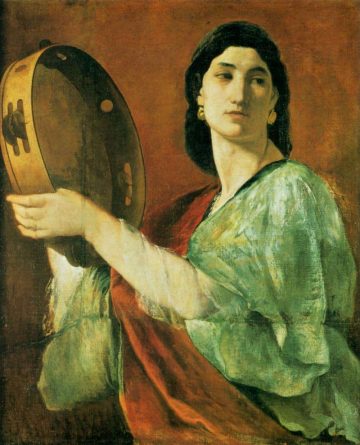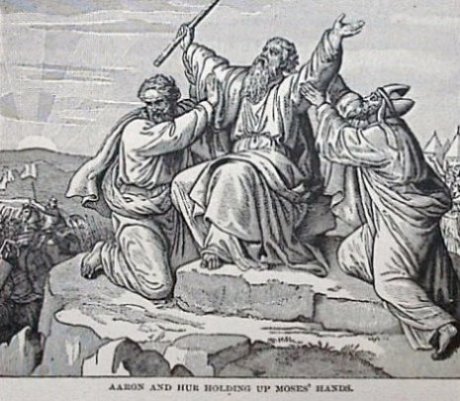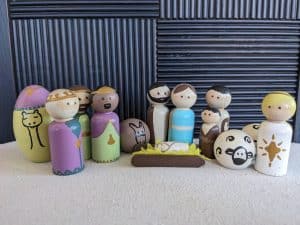The Parting of the Red Sea
These chapters begin when the Isrealites have just left Eqypt, and Pharoah and his army are in pursuit.
13 ¶ And Moses said unto the people, Fear ye not, stand still, and see the salvation of the Lord, which he will ashew to you to day: for the Egyptians whom ye have seen to day, ye shall see them again no more for ever.
14 The Lord shall afight for you, and ye shall hold your bpeace….
21 And Moses stretched out his hand over the asea; and the Lord bcaused the csea to dgo back by a strong east wind all that night, and made the sea edry land, and the fwaters were gdivided.
22 And the children of Israel went into the midst of the sea upon the dry ground: and the waters were a wall unto them on their right hand, and on their left….
26 ¶ And the Lord said unto Moses, Stretch out thine ahand over the sea, that the waters may come again upon the Egyptians, upon their chariots, and upon their horsemen.
27 And Moses stretched forth his hand over the sea, and the sea returned to ahis strength when the morning appeared; and the Egyptians fled bagainst it; and the Lord overthrew the cEgyptians in the midst of the sea.
Exodus 14:13-14, 21-22, 26-27
- How do we know when it is time to hold our peace and let the Lord fight for us?
This story has been oft-repeated as a reminder of God’s power to deliver us in crisis.
Since that time, when God’s people have needed faith and courage, they have often turned to this account of Israel’s miraculous deliverance. When Nephi wanted to inspire his brothers, he said, “Let us be strong like unto Moses; for he truly spake unto the waters of the Red Sea and they divided hither and thither, and our fathers came through, out of captivity, on dry ground” (1 Nephi 4:2). When King Limhi wanted his captive people to “lift up [their] heads, and rejoice,” he reminded them of this same story (Mosiah 7:19). When Alma wanted to testify to his son of God’s power, he also referred to this story (see Alma 36:28). And when we need deliverance—when we need a little more faith, when we need to “stand still, and see the salvation of the Lord”—we can remember how “the Lord saved Israel that day out of the hand of the Egyptians” (Exodus 14:13, 30).
—2022 Come Follow Me for Individuals and Families, Exodus 14-17
- How does the story of the parting of the Red Sea inspire you?
- How does God provide us deliverance from adversity?
- What do you learn from this story that can help you seek God’s deliverance in your life?
2 Yea, behold, I will atell you in your mind and in your bheart, by the cHoly Ghost, which shall come upon you and which shall dwell in your heart.
3 Now, behold, this is the spirit of revelation; behold, this is the spirit by which Moses abrought the children of Israel through the Red Sea on dry ground.
4 Therefore this is thy agift; apply unto it, and blessed art thou, for it shall bdeliver you out of the hands of your cenemies, when, if it were not so, they would slay you and bring your soul to destruction.
Doctrine and Covenants 8:2-4
- How do these verses affect the way we think about the events in Exodus 14?
- What do they suggest about how we seek deliverance from our trials?
- According to these verses, what is the spirit of revelation?
- How does it mean to be told in our minds and our hearts?
There are many ways to build the kingdom of God as covenant-making, covenant-keeping disciples of Jesus Christ. As His faithful disciple, you can receive personal inspiration and revelation, consistent with His commandments, that is tailored to you. You have unique missions and roles to perform in life and will be given unique guidance to fulfill them.
Nephi, the brother of Jared, and even Moses all had a large body of water to cross—and each did it differently. Nephi worked “timbers of curious workmanship.”8 The brother of Jared built barges that were “tight like unto a dish.”9 And Moses “walked upon dry land in the midst of the sea.”10
They each received personalized direction, tailored to them, and each trusted and acted. The Lord is mindful of those who obey and, in the words of Nephi, will “prepare a way for [us to] accomplish the thing which he commandeth.”11 Note that Nephi says, “a way”—not “the way.”
—Michelle D. Craig, First Counselor in the Young Women General Presidency, “Spiritual Capacity” October 2019 General Conference
- Why is it important to remember that there are “many ways to build the kingdom of God”?
- Why might we receive different inspiration about how to accomplish the same task?
Miriam, the Prophet

After safely crossing the Red Sea the children of Israel celebrate, led by Miriam, the prophet, who is Moses’s sister (Exodus 15:20-21).
Note that the King James translation identifies Miriam as a “prophetess” and Moses as a “prophet” in keeping with Old English grammar, which assigned a feminine suffix to words when the person so identified happened to be female. Other translations use modern English grammar and identify Miriam simply as a “prophet,” the same title given to Moses, or as a “woman prophet.” Prophet and prophetess are the same word and have the same definition. (See Bible Study Tools Exodus 15:20 and CBE International, Who are the woman prophets in the Bible?
20 ¶ And aMiriam the bprophetess, the csister of Aaron, took a dtimbrel in her hand; and all the women went out after her with timbrels and with dances.
21 And Miriam answered them, aSing ye to the Lord, for he hath triumphed gloriously; the horse and his rider hath he thrown into the sea.
Exodus 15:20-21
- How do we celebrate the Lord today?
- Why do we sing to the Lord?
Let’s read some stanzas from the Song of Miriam.
The LORD is my strength and song, And He has become my salvation; He is my God, and I will praise Him; My father’s God, and I will exalt Him.
Exodus 15:2, New King James Version
Note that in the Latter-day Saint version of the King James Bible, footnote D in this Exodus 15:2 changes “prepare him an habitation” to “praise him.” The original King James Bible appears to have a mistranslation here, or at least, a very unusual word choice. “Praise him” is a much more common translation of this verse. (See Biblehub Exodus 15:2)
- How is the Lord our strength and our song?
- How do we exalt God? (Isn’t God exalted already?)
At the end of the song, Miriam envisions the Israelites passing safely past their enemies.
16 aFear and bdread shall fall upon them; by the greatness of thine arm they shall be as still as a stone; till thy people pass over, O Lord, till the people pass over, which thou hast cpurchased.
17 Thou shalt bring them in, and plant them in the mountain of thine inheritance, in the place, O Lord, which thou hast made for thee to dwell in, in the aSanctuary, O Lord, which thy hands have established.
18 The aLord shall reign for ever and ever.
Exodus 15:16-18
- How are we “purchased”by the Lord?
- How can we find sanctuary in our modern lives?
The Miracle of the Manna
The problems for the children of Israel were not over once they were free from Egypt. They were free, but they were in a desolate wasteland without food. How would they eat?
2 And the whole congregation of the children of Israel amurmured against Moses and Aaron in the wilderness:
3 And the children of Israel said unto them, Would to God we had died by the hand of the Lord in the land of Egypt, when we sat by the aflesh pots, and when we did eat bread to the full; for ye have brought us forth into this wilderness, to kill this whole assembly with bhunger.
4 ¶ Then said the Lord unto Moses, Behold, I will rain abread from heaven for you; and the people shall go out and gather a certain brate every day, that I may cprove them, whether they will dwalk in my law, or no.
Exodus 16:2-4
Notice that while the word “murmured” has a negative connotation, the Lord responded favorably after the children of Israel assertively articulated their concern.
The children of Israel called this bread “manna.” Elder D. Todd Christofferson drew a parallel between gathering manna and our modern efforts to spiritually nourish ourselves. Watch the video: Daily Bread: Pattern
- What do you do for daily communion with God?
- How have you established your routine?
- How do you recognize when you need spiritual sustenance?
Notice the detailed instructions the Israelites were given about how to gather, use, and preserve the manna in these verses.
16 ¶ This is the thing which the Lord hath commanded, Gather of it every man aaccording to bhis eating, an comer for every man, according to the number of your persons; take ye every man for them which are in his tents…
19 And Moses said, Let no man leave of it till the morning…
22 ¶ And it came to pass, that on the sixth day they gathered twice as much bread, two omers for one man: and all the rulers of the acongregation came and told Moses.
23 And he said unto them, This is that which the Lord hath said, To morrow is the rest of the holy asabbath unto the Lord: bbake that which ye will bake to day, and cseethe that ye will seethe; and that which remaineth over lay up for you to be kept until the morning.
24 And they laid it up till the morning, as Moses bade: and it did not stink, neither was there any worm therein.
25 And Moses said, Eat that to day; for to day is a sabbath unto the Lord: to day ye shall not find it in the field.
26 Six days ye shall gather it; but on the seventh day, which is the sabbath, in it there shall be none.
Exodus 16:16, 19, 22–26
- What do you find in these instructions that applies to you as you seek daily spiritual nourishment?
As you use your agency to carve out time every day to draw close to God’s voice, especially in the Book of Mormon, over time His voice will become clearer and more familiar to you.
In contrast, the distractions and noise that fill the world and our homes and our lives can make it more difficult to hear His voice. These distractions can so occupy our minds and hearts that we leave no room for the gentle promptings of the Holy Ghost.
The Prophet Joseph Smith taught that most often God reveals Himself “to individuals in private, in their chamber; in the wilderness or fields, and that generally without noise or tumult.”3
Satan wants to separate us from God’s voice by keeping us out of those quiet places. If God speaks in a still, small voice, you and I need to draw close to hear Him. Just imagine what would happen if we were as intent on staying connected with heaven as we are on staying connected to Wi-Fi! Pick a time and place, and listen for God’s voice every day. And keep this sacred appointment with exactness, for so very much depends on it!
—Michelle D. Craig, First Counselor in the Young Women General Presidency, “Spiritual Capacity” October 2019 General Conference
- How do you get away from distraction and noise so you can seek spiritual nourishment?
Aaron and Hur sustain the prophet (literally)
8 ¶Then came aAmalek, and fought with Israel in Rephidim.
9 And Moses said unto aJoshua, Choose us out men, and go out, fight with Amalek: to morrow I will stand on the top of the hill with the brod of God in mine hand.
10 So Joshua did as Moses had said to him, and fought with Amalek: and Moses, Aaron, and Hur went up to the top of the hill.
11 And it came to pass, when Moses held up his hand, that Israel prevailed: and when he let down his hand, Amalek prevailed.
12 But Moses’ hands awere heavy; and they took a stone, and put it under him, and he sat thereon; and Aaron and Hur bstayed up his hands, the one on the one side, and the other on the other side; and his hands were steady until the going down of the sun.
13 And Joshua adiscomfited Amalek and his people with the edge of the sword.
President George Albert Smith explained a way for us to apply this to our lives:
Aaron and Hur held up his hands in order that the blessings of God could flow to Israel that their warriors might prevail and the battle was won. The power of God was upon Moses and remained with him until he had finished his work. When he had the support of the people they too were blessed, and so it has been with every servant of the Lord who has presided over Israel. … We, in following his leadership, must be like Aaron and Hur of ancient times; we must uphold his hands, that through him the Lord will let the blessings of heaven descend on us and this people.13
— George Albert Smith, General Conference, April 1942, in Teachings of the Presidents of the Church: George Albert Smith
When George Albert Smith was sustained as president of the church, he said,
I will need the help of every man and every woman and every child, not for my blessing, but for your blessing, and for the blessing of the children of men wherever they may be. That is not my responsibility, that is our responsibility.”1
— George Albert Smith, General Conference, October 1845, in Teachings of the Presidents of the Church: George Albert Smith
- How is blessing the people of the world “our responsibility,” not just the prophet’s responsibility?
Consider the parallel between Aaron and Hur sustaining Moses by holding up his arms and our modern tradition of raising our own arms to vote to sustain church members when they accept church callings.
We now have one order of business that is customary with these Conferences; that is, the presentation of the Authorities of the Church to be sustained by the vote of the people. I hope that you will realize, all of you, that this is a sacred privilege. … It will not be just a symbol but it will be an indication that, with the help of the Lord, you will carry your part of the work.
— George Albert Smith, General Conference, October 1846, in Teachings of the Presidents of the Church: George Albert Smith
- How does it change your perspective of the sustaining vote if you think of it as an indication that “you will carry your part of the work”?







2 Responses
[…] Deborah is the second woman identified as a prophet in the Old Testament. The first was Miriam, whom we discussed in Come Follow Me: Exodus 14–17 “Stand Still, and See the Salvation of the Lord.” […]
[…] woman identified as a prophet in the Old Testament. The first was Miriam, whom we discussed in Come Follow Me: Exodus 14–17 “Stand Still, and See the Salvation of the Lord” and the second was Deborah, whom we discussed in Come Follow Me: Judges 2–4; 6–8; 13–16 […]